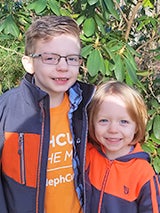Nephrotic Syndrome: Tyler and Jaxon’s Stories
Nephrotic Syndrome: Tyler and Jaxon’s Stories
Tyler, 7, and Jaxon, 4, both have a rare genetic kidney disorder, but it’s not holding them back.

When Tyler was an infant he would sometimes have swelling around his eyes. The puffiness came and went, never causing serious problems, so it wasn’t seen as a cause for alarm. His pediatrician assumed it was due to allergies.
When he was 3, Tyler started urinating much more frequently. His parents, Becka and Mark, took him to his pediatrician, where a test showed high levels of protein in his urine. That was a reason for concern, an indication of kidney problems. They were referred to Children’s Hospital of Philadelphia (CHOP).
At CHOP, the family met with Madhura Pradhan, MD, an attending physician in the Division of Nephrology. Dr. Pradhan examined Tyler and asked about other symptoms, such as swelling. When she heard about the intermittent swelling around the eyes Tyler experienced as a baby, she began to suspect a kidney problem with a genetic cause. That idea was supported by a scattered history of kidney problems in Mark’s family.
Dr. Pradhan scheduled him for a kidney biopsy and ordered genetic testing. His biopsy did not show scarring or inflammation. While waiting for the genetic test results, Tyler was given a trial of prednisone, but, unfortunately, he had no response to the steroids and was quickly weaned off.
A genetic cause for kidney disease
A month later, the results of the genetic tests showed Tyler had a mutation on the NPHS2 gene, which is involved in making a protein in the kidney called podocin. Podocin is important in maintaining the filtering function of the kidney. Specifically, it forms structures that capture proteins during the kidney’s filtering process so they are retained in the blood. In Tyler’s case, protein was leaking into his urine in large amounts due to the absence of podocin.
More than 170 different mutations of the NPHS2 gene have been found to cause various kidney (nephrotic) conditions. Many of them start to cause symptoms in childhood and progress at different rates, eventually resulting in renal failure. Based on genetic information and symptoms, Dr. Pradhan diagnosed Tyler’s with a genetic form of steroid-resistant nephrotic syndrome (SRNS).
There is no cure for Tyler’s condition, but treatment can slow the progression of the disease and push back the time when he will need dialysis or a kidney transplant. With that as the goal, Dr. Pradhan put him on a blood pressure medication which reduces protein in the urine. He has periodic urine tests at home and comes to CHOP every six months for examination.
Kidney issues, like SRNS, can affect siblings
Two months after Tyler’s diagnosis, his younger brother, Jaxon, 19 months old at the time, began to show almost identical symptoms. He started to have intermittent swelling around his eyes and urine tests showed elevated levels of protein. Jaxon did not have a kidney biopsy. It was presumed that he has the same diagnosis as Tyler. Genetic testing was not approved for him by his insurance. Dr. Pradhan started him on the same blood pressure medication, and now monitors his symptoms closely, too, along with Tyler’s. Genetic testing as part of a research study has since confirmed that Jaxon has the same NPHS2 gene mutation as Tyler.
Now 7 and 4, both boys wake up every day with swelling around their eyes. Most days, the swelling resolves over the course of the day. It doesn’t bother or slow them down.
Helping shed light on a rare kidney disease

The family has become active with NephCure Kidney International, an organization that supports research into kidney disease, with a focus on finding a cure for the diseases that cause nephrotic syndrome. Tyler is old enough to understand and participate is some of those activities, including the organization’s annual Advocacy Day in Washington, DC.
Becka and Mark know Tyler and Jaxon’s current treatment will buy them time and is not a cure, but they are glad to have a diagnosis and are confident they are in good hands. “We trust Dr. Pradhan,” says Becka. “We feel safe knowing she and the larger medical team at CHOP will take the best possible care of our boys.”